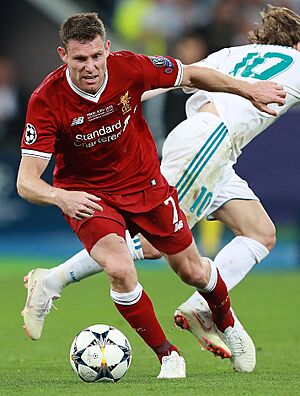James Milner facts for kids
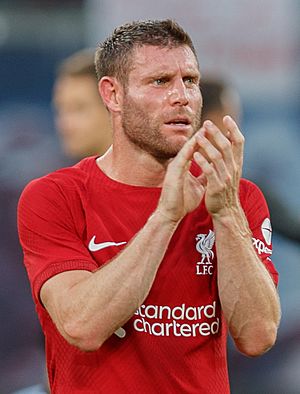
Milner playing for Liverpool in 2022
|
||||||||||||||||
| Personal information | ||||||||||||||||
|---|---|---|---|---|---|---|---|---|---|---|---|---|---|---|---|---|
| Full name | James Philip Milner | |||||||||||||||
| Date of birth | 4 January 1986 | |||||||||||||||
| Place of birth | Leeds, England | |||||||||||||||
| Height | 5 ft 9 in (1.75 m) | |||||||||||||||
| Position(s) | Midfielder / Winger / Full-back | |||||||||||||||
| Team information | ||||||||||||||||
|
Current team
|
Brighton & Hove Albion | |||||||||||||||
| Number | 6 | |||||||||||||||
| Youth career | ||||||||||||||||
| 1996–2002 | Leeds United | |||||||||||||||
| Senior career* | ||||||||||||||||
| Years | Team | Apps | (Gls) | |||||||||||||
| 2002–2004 | Leeds United | 48 | (5) | |||||||||||||
| 2003 | → Swindon Town (loan) | 6 | (2) | |||||||||||||
| 2004–2008 | Newcastle United | 94 | (6) | |||||||||||||
| 2005–2006 | → Aston Villa (loan) | 27 | (1) | |||||||||||||
| 2008–2010 | Aston Villa | 73 | (11) | |||||||||||||
| 2010–2015 | Manchester City | 147 | (13) | |||||||||||||
| 2015–2023 | Liverpool | 230 | (19) | |||||||||||||
| 2023– | Brighton & Hove Albion | 19 | (0) | |||||||||||||
| International career | ||||||||||||||||
| 2001–2002 | England U16 | 6 | (1) | |||||||||||||
| 2002–2003 | England U17 | 11 | (5) | |||||||||||||
| 2004 | England U19 | 1 | (1) | |||||||||||||
| 2003–2005 | England U20 | 6 | (0) | |||||||||||||
| 2004–2009 | England U21 | 46 | (8) | |||||||||||||
| 2009–2016 | England | 61 | (1) | |||||||||||||
|
Medal record
|
||||||||||||||||
| *Club domestic league appearances and goals, correct as of 17:00, 25 May 2025 (UTC) | ||||||||||||||||
James Philip Milner (born on January 4, 1986) is an English professional footballer. He plays as a midfielder for Brighton & Hove Albion. Milner is known for being a very flexible player. He can play in many different positions on the field. These include on the wing, in the middle of the field, and as a full-back.
Milner showed great talent in football, cricket, and running from a young age. He played these sports for his school, Horsforth School. He also played football for local amateur teams. James grew up supporting Leeds United. He joined their youth academy in 1996. In 2002, at just 16 years old, he made his debut for the first team. He became the youngest player to score in the Premier League. Later, he played on loan for Swindon Town to get more experience.
After Leeds United was moved down to a lower league in 2004, Milner was sold to Newcastle United. He played over 100 games for Newcastle and won the UEFA Intertoto Cup in 2006. He also spent a year on loan at Aston Villa before joining them permanently in 2008. In 2010, he won the PFA Young Player of the Year award. After this, Manchester City signed him. With Manchester City, he won two Premier League titles, one FA Cup, one League Cup, and one FA Community Shield.
In 2015, Milner moved to Liverpool for free. He became the team's vice-captain. At Liverpool, he won the UEFA Champions League in 2019. He also won his third Premier League title, the UEFA Super Cup, the FIFA Club World Cup, and another FA Cup and League Cup.
Milner played a record 46 games for the England national under-21 football team. He played in the 2007 and 2009 UEFA European Under-21 Championships, finishing second in 2009. He played 61 games for the main national team, scoring one goal. He was part of England's teams for the 2010 and 2014 FIFA World Cups. He also played in the 2012 and 2016 UEFA European Championships.
Milner has played the second-highest number of games in the Premier League, only behind Gareth Barry. He also holds the record for the longest playing career in the Premier League, which is currently 23 years.
Contents
Milner's Early Life and Football Journey
James Philip Milner was born on January 4, 1986, in Wortley, Leeds. He played most of his childhood football for Westbrook Lane Primary School. One of his coaches there was future Premier League referee Jon Moss.
Milner later went to Horsforth School. A coach named Graeme Coulson saw Milner's talent. He convinced James to play for Rawdon in several tournaments. Milner scored four goals in one final game, helping his team win.
Milner was a very good student at school. He earned 11 GCSEs and an award for his skills in physical education. He also played for the Yorkshire Schools cricket team. He was his school's cross-country champion for three years. He was also the district champion in the 100-meter race for two years. He continued his studies at Boston Spa School, a sports college linked to the football club.
Milner supported his hometown club, Leeds United, from a young age. He remembered watching them win the FA Youth Cup in 1993. He and his parents had season tickets for the club. Milner later became a ball boy for Leeds.
When Milner was 10, he joined the Leeds United Academy. A scout saw him playing for Westbrook Juniors. At the academy, Milner played against other young talents, including future Manchester United striker Wayne Rooney. His hero was Alan Smith, a Leeds United striker. Milner felt playing with Smith taught him a lot. He saw Smith as someone who had achieved what he wanted to do: come through the academy and play for the first team. After school, Milner became a trainee at the Academy. However, his father made sure he still went to college once a week to continue his education.
Milner kept doing well in the youth team. He played for England's under-15 and under-17 teams. He helped the England under-17 team win a tournament in 2002. They played against Italy, Czech Republic, and Brazil. Milner even scored a goal against Brazil.
Club Career Highlights
Starting at Leeds United
Milner played his first game for Leeds on November 10, 2002. It was against West Ham United. He came on as a substitute for the last six minutes. This made him the second-youngest player ever in the Premier League, at 16 years and 309 days old. On December 26, 2002, at 16 years and 356 days, he became the youngest player to score in the Premier League. His goal helped Leeds win 2–1 against Sunderland. This record was later broken in 2005.
Two days later, against Chelsea, Milner scored again. He showed great skill to get past a defender and score from 18 yards. Reporters were impressed by his performance. They noted his determination, confidence, and ability to use both feet. Chelsea's manager, Claudio Ranieri, said Milner played like a much more experienced player. People started comparing him to famous young players like Michael Owen and Wayne Rooney.
After playing more games for Leeds, Milner signed a five-year contract on February 10, 2003. At the start of the 2003–04 season, Milner went on a one-month loan to Second Division club Swindon Town. This was to get more experience playing in the first team. He played six matches for Swindon and scored two goals.
However, Leeds United faced financial problems. Many first-team players were sold. Milner said this made him stronger and taught him how to handle team difficulties. Leeds was eventually moved down to the Championship. This led to talk about Milner leaving the club. Teams like Tottenham Hotspur, Aston Villa, and Everton were interested. Milner turned down Tottenham because it was too far from his family home. Leeds initially said they would not sell him, calling him "the future of Leeds." But financial issues forced Leeds to sell Milner to Newcastle United for £5 million. Milner was sad to leave his childhood club. But he wanted to do what was "in the club's best interest." In July 2004, he signed a five-year contract with Newcastle.
Time at Newcastle United
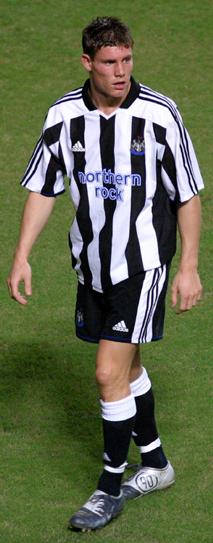
Milner first played for Newcastle United during their pre-season tour in Asia. He scored his first goal for the club in a 1–1 draw in Hong Kong. During this tour, he learned from striker Alan Shearer how to deal with fans and the media.
Milner's first Premier League game for Newcastle was on August 18, 2004, against Middlesbrough. He played as a winger on the right side. A month later, he played his first European game in the UEFA Cup. He came on as a substitute against Bnei Sakhnin from Israel. In the same month, he scored his first goal for Newcastle in a 3–1 win against West Bromwich Albion.
Things changed for Milner when Newcastle manager Bobby Robson was replaced by Graeme Souness. Under Souness, Milner started 13 league games but did not play a full Premier League match until April 2005. Milner felt frustrated that he wasn't starting more often.
At the start of the 2005–06 season, Milner scored in Newcastle's 3–1 win in the UEFA Intertoto Cup. He also helped set up a goal for Alan Shearer.
Loan to Aston Villa
Milner was loaned to Aston Villa for the rest of the season. This was part of a deal when Newcastle bought another player from Villa. Villa manager David O'Leary, who had coached Milner at Leeds, was happy to have him. He believed Villa got a good deal and hoped to help Milner improve. Milner played his first game for Villa on September 12, 2005, against West Ham United. Five days later, he scored his first goal for Villa in a 1–1 draw against Tottenham Hotspur. In a League Cup game, he scored two goals to help his team win 8–3 after being 3–1 down at half-time. Milner was always positive about his team during the season.
Milner was seen as a good addition to Villa, even though the season was tough for them. Milner liked the loan move and wanted to join Villa permanently. He felt he would be a regular starter there. Manager David O'Leary also wanted to sign Milner permanently.
However, the new Newcastle manager, Glenn Roeder, wanted Milner to stay. This, along with O'Leary leaving Villa and a lack of money for transfers, made a permanent move seem unlikely. But then, American billionaire Randy Lerner took over Villa, and Martin O'Neill became the new manager. A move to Villa seemed agreed, but Newcastle called Milner back at the last minute.
Back at Newcastle United
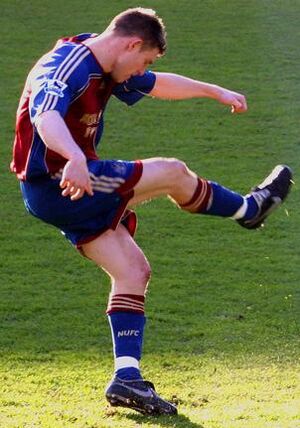
Newcastle's players and manager Glenn Roeder were happy when Milner returned for the 2006–07 season. Milner was a regular starter for Newcastle that season.
Newcastle had a tough start in the Premier League. But in European games, Milner helped them reach the round of 16 in the UEFA Cup. He played in almost all of their 12 games. There were rumors that he would be sold in January, but both Milner and Roeder said this was not true.
On January 1, 2007, Milner scored his first goal of the season in a 2–2 draw with Manchester United. He scored from a "stunning" shot from 25 yards away. He scored two more goals in the next three weeks. These were against Birmingham City and West Ham United. During the season, Milner showed he could play well in many different positions. He scored and set up goals with both feet from both sides of the field. Because of this, Milner signed a new contract with Newcastle in January, keeping him at the club until 2011. He signed another four-year contract in May 2007 when Sam Allardyce became the new manager. Milner said he was happy about his future at the club and with the new manager. Allardyce praised Milner, saying he was "a hugely experienced Premier League player."
In late October, Milner scored Newcastle's 500th home Premier League goal in a 3–1 win over Tottenham Hotspur. His second Premier League goal of the season came in the Tyne–Wear derby. It was a shot meant as a cross that went into the net. Allardyce continued to praise Milner, calling him "a hugely experienced Premier League player."
Milner missed the last nine games of the season due to a foot injury. In May 2008, there were rumors that Milner would be part of a transfer deal between Newcastle and Liverpool. Even though he started the season for Newcastle and scored in a League Cup win, it was later revealed that Milner had asked to leave the club the week before.
Returning to Aston Villa
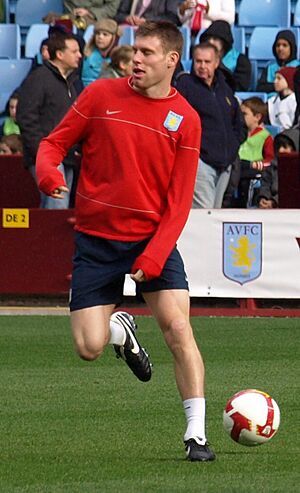
Milner joined Aston Villa on August 29, 2008, for £12 million. He signed a four-year contract. Milner played his first game for Villa on August 31, 2008, as a substitute against Liverpool. His first goals in his second time at Villa came in an FA Cup game on his 23rd birthday, January 4, 2009. He scored both goals in a 2–1 win for Villa.
Milner's first Premier League goal in his second spell at Villa was on January 17, 2009, in a 2–1 win against Sunderland. On February 7, 2009, Milner was called up to the England senior team for the first time. England manager Fabio Capello was impressed by his club performances. Milner continued to play well. He scored his second league goal of the season against Blackburn Rovers. This was followed by a 25-yard free kick against Everton. Villa came back from being 3–1 down to draw 3–3. Milner said that his time at Villa was the "most settled" period of his career. He had played for thirteen managers and caretakers, even though he was only 23.
At the start of the 2009–10 season, Milner moved to the center of midfield. This happened after the team's captain, Gareth Barry, was sold. Milner's goal against Sunderland in December 2009 was voted Aston Villa's Goal of the Season. On February 28, 2010, he scored the first goal in the 2010 League Cup final with a penalty. Villa lost the final 2–1 to Manchester United. Milner finished the season with 12 goals. He was named Aston Villa's Supporters' Player of the Year and PFA Young Player of the Year.
On May 19, 2010, Manchester City offered £20 million for Milner, but Villa rejected it. On July 22, 2010, Villa manager Martin O'Neill said Milner wanted to leave for City. But he would only be sold at Villa's price. On August 14, Milner played in Villa's first game of the season against West Ham United. He scored Villa's third goal. Milner received a standing ovation when he was substituted near the end of the match.
Playing for Manchester City

On August 17, 2010, Aston Villa agreed to sell Milner to Manchester City. The deal was reportedly worth around £26 million. It also included a player exchange. Milner played his first game for City on August 23, 2010. It was a 3–0 home win against Liverpool. He helped set up the first goal for his former Villa teammate, Gareth Barry. Milner scored his first goal for Manchester City in an FA Cup game against Leicester City. The game ended in a 2–2 draw. This Leicester match was the start of a cup run that saw Manchester City reach the 2011 FA Cup final. Milner was a substitute in the final as Manchester City beat Stoke City 1–0 to win the FA Cup.
Milner scored his first Premier League goal for Manchester City against Everton on September 24, 2011. Two games later, he scored his second goal against his old club, Aston Villa, in a 4–1 win. The next week, Milner helped set up two goals as Manchester City won the Manchester derby 6–1. This was Manchester United's biggest home league defeat since 1930. During the 2011–12 season, Milner played in 26 Premier League games. Manchester City won the league title for the first time in 44 years.
Milner won his first Community Shield in August 2012. City beat Chelsea at Villa Park. On October 6, 2012, Milner scored his first goal of the 2012–13 season from a free kick. This sealed a 3–0 win against Sunderland. On October 20, he received his first Premier League red card in a 2–1 win at West Bromwich Albion. On January 13, 2013, he scored City's first goal in a 2–0 win at Arsenal. This was the first time a City player had scored away at Arsenal in the League since 2007. It was also City's first league win at Arsenal since 1975. On April 8, he scored in the Manchester derby as City beat Manchester United 2–1.
On December 10, 2013, Milner scored the winning goal in a 3–2 win against Bayern Munich in the UEFA Champions League. He became the first English player to score for Manchester City in that competition that season. That season, Milner won his first League Cup and his second Premier League title.
Years at Liverpool
Winning the Champions League
On June 4, 2015, Milner agreed to join Liverpool for free from Manchester City. On August 7, 2015, he was named the team's vice-captain. Milner played his first game for Liverpool in a 1–0 win over Stoke City. He captained Liverpool for the first time in his third game, a 0–0 draw at Arsenal. On September 26, 2015, he scored his first goal for Liverpool in a 3–2 win against his old club, Aston Villa. He played in the 2016 UEFA Europa League final at the end of his first season. Milner finished his first season with Liverpool with seven goals and 15 assists.
On March 19, 2017, Milner scored in Liverpool's 1–1 draw against his former club, Manchester City. By doing so, he set a Premier League record. He had played the most matches where he scored without his team losing (47 matches). In the 2017–18 season, Milner made 9 assists in a single Champions League campaign. This set a new record, beating the previous records held by Wayne Rooney and Neymar.
In November 2018, Milner scored his 50th Premier League goal in a 1–1 draw at Arsenal. The next month, Milner became only the 13th player in Premier League history to reach 500 appearances. He was the second youngest to do so, after Gareth Barry. This happened in a 4–0 win at Bournemouth. On June 1, 2019, Milner won his first Champions League title. He came on as a substitute in the final against Tottenham, and Liverpool won 2–0.
Premier League Title and Other Successes

On August 14, 2019, Milner won his first UEFA Super Cup. He started the 2019 match against Chelsea, and Liverpool won after a penalty shoot-out. In December 2019, Milner signed a new contract. Later that month, Milner came on as a substitute as Liverpool won the FIFA Club World Cup for the first time. They beat Flamengo 1–0 in the final. On December 26, 2019, Milner scored a penalty in a 4–0 Premier League win over Leicester City. This was the last goal Milner scored for Liverpool. On June 25, 2020, Milner won his third Premier League title, and his first with Liverpool.
Milner was not a regular starter during the 2020–21 season. He started only 11 games and played 26 matches in total. He had his first season without scoring any goals. However, he remained an important player. Liverpool faced many challenges but finished third, qualifying for the next season's Champions League.
On February 16, 2022, Milner played his 800th senior club game. He came on as a substitute in a 2–0 Champions League win against Inter Milan. On February 27, 2022, Milner scored Liverpool's first penalty in the 2022 EFL Cup final shoot-out victory over Chelsea. On May 14, 2022, Milner again scored Liverpool's first penalty in the 2022 FA Cup final shoot-out win over Chelsea. On June 6, 2022, Milner signed a one-year extension with the club.
On October 5, 2022, Milner played his 300th game for Liverpool. This was in a 2–0 win against Rangers in the 2022–23 Champions League. On November 12, he came on as a substitute against Southampton. This made it his 600th Premier League appearance. On April 4, 2023, in a 0–0 draw against Chelsea, Milner played his 610th Premier League game. This moved him to third place in the all-time Premier League appearance list. In May 2023, Liverpool announced that Milner would leave the club at the end of the 2022–23 season.
Joining Brighton & Hove Albion
On June 14, 2023, Brighton & Hove Albion announced that Milner would join them. He signed a one-year contract with an option for another year. He played his first game for Brighton on August 12, 2023. This was in their first game of the 2023–24 season. He started and played 79 minutes in a 4–1 home win. On September 16, he played in a 3–1 away win over Manchester United. This made him the first player to win at Old Trafford with four different clubs. He also achieved a record of 11 total wins, including 6 away wins, against Manchester United.
On January 22, 2024, Milner played his 633rd Premier League match. This was in a home draw against Wolverhampton. He moved ahead of Ryan Giggs to be second in all-time appearances, only behind Gareth Barry.
On May 15, 2024, Milner signed a new one-year deal with Brighton. He played in the 2024–25 season opening match on August 17, 2024. Brighton won 3–0 away against Everton. This made him the first player to play 23 Premier League seasons. Later that month, on August 31, 2024, he got a hamstring injury in a 1–1 draw against Arsenal. This injury kept him out for the rest of that season. On May 25, 2025, he came on as a late substitute in a 4–1 away victory against Tottenham Hotspur on the final matchday of the season.
On June 13, 2025, it was announced that Milner had extended his contract by another year to stay at Brighton.
International Career for England
Youth Teams
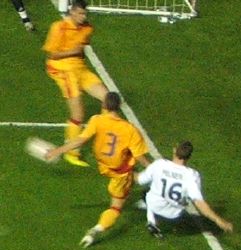
After playing for England's under-15 and under-17 teams, Milner was called up to the under-20 team. He was chosen for the 2003 World Youth Championship. However, Leeds United called him back four days before the first game. Soon after, under-21 manager Peter Taylor called him up to the England under-21 team. Milner played his first game for them against Sweden on March 30, 2004.
Milner scored for the England under-21 team during the 2004–05 season. It was a qualification game for the 2007 UEFA European Under-21 Championship against Wales. He played in the center of midfield and helped set up a goal. England won 2–0. Despite problems with his club team, he continued to do well internationally. He scored the winning goal for the England under-21 team in a 3–2 win over Switzerland. This win helped England get into the playoff stage for the 2007 UEFA European Under-21 Championship.
In June 2007, Milner played for England at the 2007 UEFA European Under-21 Championship. He played in all four of England's matches. He received a yellow card in the semi-final against the Netherlands, which meant he would have missed the final. The game was decided by a penalty shoot-out. Milner scored twice, but England lost 13–12. Milner was also in the under-21 squad for a friendly game against Romania, which ended in a 1–1 draw. A month later, Milner set an England under-21 record. He made his 30th appearance for the team in a 3–0 win against Montenegro. In October, he scored his third goal for the under-21 team in a 3–0 win over Republic of Ireland. He scored again in the return match four months later, which England also won 3–0.
Milner continued to be a regular player. He was the only player, along with Joe Hart and captain Steven Taylor, to have played in all the qualifying games for the 2009 UEFA European Under-21 Championship. In the summer of 2009, he was in the squad for the tournament in Sweden. He helped set up the winning goal against Finland. In England's second game against Spain, Milner had a penalty saved but then scored England's second goal in a 2–0 win. England played the hosts, Sweden, in the semi-finals. The game ended in a 3–3 draw and went to a penalty shoot-out. Milner was the only England player to miss in the shoot-out. He slipped just before kicking the ball, and it went over the goal. England won the shoot-out 5–4 and reached the final for the first time in 25 years. England lost the final to Germany 4–0. Milner said after the game that the team was "hurting" and that the way they lost was "not good enough." The final was his last game for the under-21 team. His 46 appearances at under-21 level are a national record.
Senior England Team
In August 2009, Milner played his first game for the England senior team. He came on as a substitute in a friendly match against the Netherlands. The game ended in a 2–2 draw. He played for England again the next month against Slovenia in another friendly. He made his first competitive appearance four days later in a 2010 FIFA World Cup qualifier against Croatia. England won that game 5–1 and qualified for the 2010 FIFA World Cup.
Milner was chosen for the World Cup in South Africa. He started England's first game against the United States, but was substituted after 30 minutes. In England's third game against Slovenia, he helped set up the only goal for Jermain Defoe. He captained England for the first time for the last 10 minutes of a 2–1 loss against France on November 17, 2010.
Milner played in six games during qualifying for UEFA Euro 2012. He was named in Roy Hodgson's 23-man squad for the tournament. Milner started Hodgson's first game as manager, a 1–0 friendly win against Norway. He started all of England's group stage games. England finished first in their group and qualified for the quarter-finals. He started the quarter-final game but was taken off after an hour. England was knocked out by Italy in a penalty shoot-out.
On September 7, 2012, Milner scored his first and only international goal. It was in a 5–0 win away to Moldova during 2014 FIFA World Cup qualifying. Milner was included in Hodgson's squad for the 2014 FIFA World Cup. However, Milner did not get a regular starting spot. He came on as a substitute in the final group game against Costa Rica. England had already been eliminated, and the game ended in a 0–0 draw. Milner was part of the England squad for Euro 2016. But again, he did not get much playing time. He played only five minutes in the group stage and did not play in England's loss to Iceland.
On August 5, 2016, Milner announced he was retiring from international duty. This decision came after talks with the new England manager, Sam Allardyce. England manager Gareth Southgate later asked Milner if he would return for the 2018 World Cup, but Milner chose not to.
Milner's Style of Play
Milner is famous for being very versatile. Throughout his career, he has played as a winger, central midfielder, defensive midfielder, attacking midfielder, and full-back. His favorite position is central midfield. When he was at Leeds United and Newcastle United, Milner mostly played as a winger. He has been described as "comfortable on either wing." He moved to central midfield during his time at Aston Villa.
Under manager Jürgen Klopp, Milner played the entire 2016–17 season as a left back for Liverpool. Milner said he did not enjoy playing left back. But he also said: "It's about whatever's best for the team and ultimately I just want to be out there playing games, contributing and helping this football club." He also played as a holding midfielder and a box-to-box midfielder for Liverpool in later seasons. He received praise for his energy, hard work, and consistent performances.
Milner is known for being a tough and determined footballer. Manuel Pellegrini, who managed Milner at Manchester City, called him the most complete English player in modern football. He praised Milner's all-around ability, commitment, and flexibility. Milner is often seen as one of the most underrated players of his time. The Telegraph listed him as number seven in their list of "The top 20 most under-rated footballers of all time" in 2015. They described him as "hard working, reliable and intelligent."
Milner can pass the ball accurately and shoot from far away. Because of this, he often takes set pieces, like corners and free kicks. While Milner does not score many goals, he is very good at providing assists. As of August 2024, he is 9th on the all-time Premier League assist chart.
The Newcastle United official website once described Milner as "a good reader of the game." This skill helps him pass the ball to teammates who are running forward. It also gives him the confidence to challenge defenders.
Milner's Personal Life
Milner is married to Amy Fletcher. They have two children, a daughter and a son. Milner learned to speak Spanish so he could talk better with his teammates. He speaks to his children only in Spanish to help them learn the language too.
Milner started the James Milner Foundation. This foundation holds an annual ball to raise money for different charities. He does not drink alcohol.
Milner was awarded the Member of the Order of the British Empire (MBE) in 2022. This was for his contributions to football and charity.
Career Statistics
Club Appearances and Goals
| Club | Season | League | FA Cup | League Cup | Continental | Other | Total | |||||||
|---|---|---|---|---|---|---|---|---|---|---|---|---|---|---|
| Division | Apps | Goals | Apps | Goals | Apps | Goals | Apps | Goals | Apps | Goals | Apps | Goals | ||
| Leeds United | 2002–03 | Premier League | 18 | 2 | 4 | 0 | 0 | 0 | 0 | 0 | — | 22 | 2 | |
| 2003–04 | Premier League | 30 | 3 | 1 | 0 | 1 | 0 | — | — | 32 | 3 | |||
| Total | 48 | 5 | 5 | 0 | 1 | 0 | 0 | 0 | 0 | 0 | 54 | 5 | ||
| Swindon Town (loan) | 2003–04 | Second Division | 6 | 2 | — | — | — | — | 6 | 2 | ||||
| Newcastle United | 2004–05 | Premier League | 25 | 1 | 4 | 0 | 1 | 0 | 11 | 0 | — | 41 | 1 | |
| 2005–06 | Premier League | 3 | 0 | — | — | 4 | 2 | — | 7 | 2 | ||||
| 2006–07 | Premier League | 35 | 3 | 2 | 1 | 3 | 0 | 13 | 0 | — | 53 | 4 | ||
| 2007–08 | Premier League | 29 | 2 | 2 | 1 | 1 | 0 | — | — | 32 | 3 | |||
| 2008–09 | Premier League | 2 | 0 | — | 1 | 1 | — | — | 3 | 1 | ||||
| Total | 94 | 6 | 8 | 2 | 6 | 1 | 28 | 2 | 0 | 0 | 136 | 11 | ||
| Aston Villa (loan) | 2005–06 | Premier League | 27 | 1 | 3 | 0 | 3 | 2 | — | — | 33 | 3 | ||
| Aston Villa | 2008–09 | Premier League | 36 | 3 | 3 | 3 | — | 4 | 0 | — | 43 | 6 | ||
| 2009–10 | Premier League | 36 | 7 | 5 | 0 | 6 | 4 | 2 | 1 | — | 49 | 12 | ||
| 2010–11 | Premier League | 1 | 1 | — | — | — | — | 1 | 1 | |||||
| Total | 100 | 12 | 11 | 3 | 9 | 6 | 6 | 1 | 0 | 0 | 126 | 22 | ||
| Manchester City | 2010–11 | Premier League | 32 | 0 | 3 | 2 | 1 | 0 | 5 | 0 | — | 41 | 1 | |
| 2011–12 | Premier League | 26 | 3 | 1 | 0 | 3 | 0 | 6 | 0 | 1 | 0 | 37 | 3 | |
| 2012–13 | Premier League | 26 | 4 | 6 | 0 | 1 | 0 | 2 | 0 | 1 | 0 | 36 | 4 | |
| 2013–14 | Premier League | 31 | 1 | 4 | 0 | 3 | 0 | 6 | 1 | — | 44 | 2 | ||
| 2014–15 | Premier League | 32 | 5 | 2 | 2 | 2 | 0 | 8 | 1 | 1 | 0 | 45 | 8 | |
| Total | 147 | 13 | 16 | 4 | 10 | 0 | 27 | 2 | 3 | 0 | 203 | 18 | ||
| Liverpool | 2015–16 | Premier League | 28 | 5 | 1 | 0 | 4 | 0 | 12 | 2 | — | 45 | 7 | |
| 2016–17 | Premier League | 36 | 7 | 0 | 0 | 4 | 0 | — | — | 40 | 7 | |||
| 2017–18 | Premier League | 32 | 0 | 2 | 1 | 0 | 0 | 13 | 0 | — | 47 | 1 | ||
| 2018–19 | Premier League | 31 | 5 | 1 | 0 | 1 | 0 | 12 | 2 | — | 45 | 7 | ||
| 2019–20 | Premier League | 22 | 2 | 2 | 0 | 2 | 2 | 8 | 0 | 3 | 0 | 37 | 4 | |
| 2020–21 | Premier League | 26 | 0 | 2 | 0 | 1 | 0 | 6 | 0 | 1 | 0 | 36 | 0 | |
| 2021–22 | Premier League | 24 | 0 | 3 | 0 | 4 | 0 | 8 | 0 | — | 39 | 0 | ||
| 2022–23 | Premier League | 31 | 0 | 2 | 0 | 1 | 0 | 8 | 0 | 1 | 0 | 43 | 0 | |
| Total | 230 | 19 | 13 | 1 | 17 | 2 | 67 | 4 | 5 | 0 | 332 | 26 | ||
| Brighton & Hove Albion | 2023–24 | Premier League | 15 | 0 | 0 | 0 | 0 | 0 | 5 | 0 | — | 20 | 0 | |
| 2024–25 | Premier League | 4 | 0 | 0 | 0 | 0 | 0 | — | — | 4 | 0 | |||
| 2025–26 | Premier League | 0 | 0 | 0 | 0 | 0 | 0 | — | — | 0 | 0 | |||
| Total | 19 | 0 | 0 | 0 | 0 | 0 | 5 | 0 | — | 24 | 0 | |||
| Career total | 644 | 57 | 53 | 10 | 43 | 9 | 133 | 9 | 8 | 0 | 881 | 85 | ||
International Appearances and Goals
| National team | Year | Apps | Goals |
|---|---|---|---|
| England | 2009 | 6 | 0 |
| 2010 | 9 | 0 | |
| 2011 | 8 | 0 | |
| 2012 | 11 | 1 | |
| 2013 | 10 | 0 | |
| 2014 | 9 | 0 | |
| 2015 | 4 | 0 | |
| 2016 | 4 | 0 | |
| Total | 61 | 1 | |
- England score listed first, score column indicates score after Milner goal
| No. | Date | Venue | Cap | Opponent | Score | Result | Competition | Ref. |
|---|---|---|---|---|---|---|---|---|
| 1 | 7 September 2012 | Zimbru Stadium, Chișinău, Moldova | 32 | 4–0 | 5–0 | 2014 FIFA World Cup qualification |
Honours and Awards
Newcastle United
- UEFA Intertoto Cup: 2006
Aston Villa
- Football League Cup runner-up: 2009–10
Manchester City
- Premier League: 2011–12, 2013–14
- FA Cup: 2010–11; runner-up: 2012–13
- Football League Cup: 2013–14
- FA Community Shield: 2012
Liverpool
- Premier League: 2019–20
- FA Cup: 2021–22
- Football League Cup/EFL Cup: 2021–22; runner-up: 2015–16
- FA Community Shield: 2022
- UEFA Champions League: 2018–19; runner-up: 2017–18, 2021–22
- UEFA Super Cup: 2019
- FIFA Club World Cup: 2019
- UEFA Europa League runner-up: 2015–16
England U21
- UEFA European Under-21 Championship runner-up: 2009
Individual
- PFA Young Player of the Year: 2009–10
- PFA Team of the Year: 2009–10 Premier League
- Aston Villa Supporters' Player of the Year: 2009–10
See also
 In Spanish: James Milner para niños
In Spanish: James Milner para niños
- List of men's footballers with 1,000 or more official appearances
 | DeHart Hubbard |
 | Wilma Rudolph |
 | Jesse Owens |
 | Jackie Joyner-Kersee |
 | Major Taylor |


